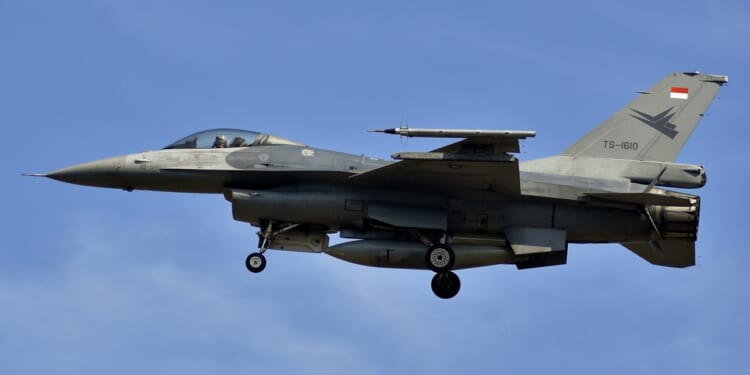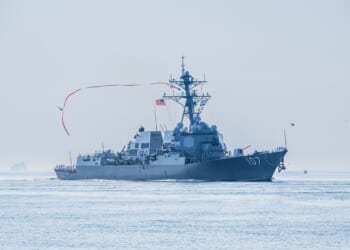Indonesian critics have alleged that funds for the Trident program, estimated to cost $125 billion over the next decade, would be better spent on other national priorities.
Indonesia remains the most important nation in Southeast Asia. It has a massive economy, population, and a world-class military. Toward that end, Indonesia’s defense ministry under Prabowo Subianto, the Indonesian defense minister, introduced a 25-year force modernization framework to follow an earlier “Minimum Essential Force” (MEF) concept.
That force modernization plan is known as Perisai Trisula Nusantara, or “Trident Shield of Nusantara”—“Nusantara” being the name of the Indonesian archipelago and the name of the future capital region for the country.
About Indonesia’s Trident Shield
This long-term plan both for modernization and holistic national defense doesn’t imply that the country is ready for immediate, large-scale war. Rather, the framework indicates that the country is interested in raising its capabilities, enhancing deterrence, and ensuring its sovereignty in a region that is increasingly divided between competing, rival powers, such as China, Japan, and Australia to name just a few.
As a medium-sized power, Indonesia does not want to risk being left at the tender mercies of these competing foreign powers. Indonesia is a vital nation in the Indo-Pacific, bestriding key sea lanes that are critical for global trade (the Malacca Strait, Sulawesi Sea, and the Java Sea). There are an astonishing more than 17,000 islands that comprise the archipelago.
So, modernizing defenses is not just a luxury for Jakarta. It’s an imperative.
There are some key elements that make the Trident Shield project really impressive for Indonesia. For instance, the program calls for procuring major platforms, such as submarines, frigates, missile-armed fast attack vessels, and long-range missiles. Trident Shield also urges greater levels of integration between the Indonesian army, navy, and air force—hence the three-pronged “Trident” moniker. However, given Indonesia’s geography, the navy will be granted increased emphasis as a matter of practicality.
Indonesia’s defense plan calls for an emphasis on its defense industry, its logistics, maintenance, and supply chains. The plan recognizes that acquiring hardware is simply not enough if you cannot maintain or operate it sustainably—and in a contested environment.
Can Indonesia Afford the Trident Plan?
Yet, this plan is assessed to cost around $125 billion over the next 25 years. While that number may be peanuts for the American defense establishment, it is a huge investment for a country that is relatively small and has a finite military budget.
Not everyone is onboard with this plan either. The Jakarta Post argued that the Trident Shield is a boondoggle, and Indonesia should instead focus on balancing the Indonesian budget and investing in next-generation technologies, like quantum computing, to ensure the country remains dominant.
If, however, Trident Shield works as Indonesian leaders believe it will, the country will find itself a much bigger player in the politics of the region. Indonesia becomes a stabilizer in Southeast Asia, too.
With these new capabilities, Jakarta moves away from simply responding to crises but quickly evolves into Indonesia’s military being able to anticipate threats, integrate domains, and build capacity to act rather than simply defend. In today’s age, that is a key capability.
Indonesia’s “Nusantara Trident Shield” is more than just hardware. It is a strategic declaration that the archipelago nation intends to rise from being just another non-aligned bystander to a credible regional pillar of deterrence and defense. By investing across all strategic domains, and by emphasizing system-wide modernization, Jakarta is repositioning itself in the Indo-Pacific power game.
What Happens Next?
If successful, Trident Shield will fundamentally change Indonesia’s security posture from reactive perimeter defense to active strategic influence—meaning that Jakarta will be less worried about being drawn into someone else’s war, and more able to shape its own security environment.
But—and this is the real test—capability is not built overnight. Budget discipline, industrial maturity, logistical integrity, proper jointness, and geopolitical realities must all align. If one weak link appears, Jakarta’s grand strategic vision could become nothing more than a delusion.
Keep an eye on Indonesia. Its future defense investment isn’t just about buying planes or ships. Jakarta is keenly reshaping its role in the Indo-Pacific for the long-term. The Trident Shield is just the blueprint.
About the Author: Brandon J. Weichert
Brandon J. Weichert is a senior national security editor at The National Interest. Recently, Weichert became the host of The National Security Hour on America Outloud News and iHeartRadio, where he discusses national security policy every Wednesday at 8pm Eastern. He is also a contributor at Popular Mechanics and has consulted regularly with various government institutions and private organizations on geopolitical issues. Weichert’s writings have appeared in multiple publications, including The Washington Times, National Review, The American Spectator, MSN, The Asia Times, and others. His books include Winning Space: How America Remains a Superpower, Biohacked: China’s Race to Control Life, and The Shadow War: Iran’s Quest for Supremacy. His newest book, A Disaster of Our Own Making: How the West Lost Ukraine is available for purchase wherever books are sold. He can be followed via Twitter @WeTheBrandon.
Image: Shutterstock / Gani_Prastowo.


















